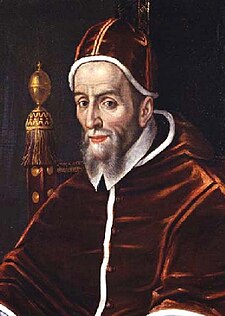Giovanni Battista Castagna
|
Pope Urban VII |
|
|---|---|
| Bishop of Rome | |
 |
|
| Papacy began | 15 September 1590 |
| Papacy ended | 27 September 1590 |
| Predecessor | Sixtus V |
| Successor | Gregory XIV |
| Orders | |
| Ordination | 30 March 1553 by Filippo Archinto |
| Consecration | 4 April 1553 by Girolamo Verallo |
| Created Cardinal | 12 December 1583 by Pope Gregory XIII |
| Personal details | |
| Birth name | Giovanni Battista Castagna |
| Born |
4 August 1521 Rome, Papal States |
| Died | 27 September 1590 (aged 69) Rome, Papal States |
| Previous post |
|
| Coat of arms | |
|
Papal styles of Pope Urban VII |
|
|---|---|
 |
|
| Reference style | His Holiness |
| Spoken style | Your Holiness |
| Religious style | Holy Father |
| Posthumous style | None |
Pope Urban VII (Latin: Urbanus VII; 4 August 1521 – 27 September 1590), born Giovanni Battista Castagna, was Pope from 15 to 27 September 1590. His twelve-day papacy was the shortest in history.
Giovanni Battista Castagna was born in Rome in 1521 to a noble family as the son of Cosimo Castagna and Costanza Ricci Giacobazzi. He was of Genoese origin, although born in Rome.
Castagna studied in universities all across Italy and obtained a doctorate in civil law and canon law when he finished his studies at the University of Bologna. He served as a constitutional lawyer and entered the Roman Curia during the pontificate of Pope Julius III as the Referendary of the Apostolic Signatura. Castagna was chosen to be the new Archbishop of Rossano on 1 March 1553, and he would quickly receive all the minor and major orders culminating in his ordination to the priesthood on 30 March 1553 in Rome. He then received episcopal consecration a month after at the home of Cardinal Girolamo Veralli.
He served as the Governor of Fano from 1555 to 1559 and later served as the Governor of Perugia and Umbria from 1559 to 1560. Castagna would later participate in the Council of Trent from 1562 to 1563 and served as the president of several conciliar congregations. He was appointed as the Apostolic Nuncio to Spain in 1565 and served there until 1572, resigning his post from his archdiocese a year later. He also served as the Governor of Bologna from 1576 to 1577. Among other positions, he was the Apostolic Nuncio to Venice from 1573 to 1577 and served also as the Papal Legate to Flanders and Cologne from 1578 to 1580.
...
Wikipedia
